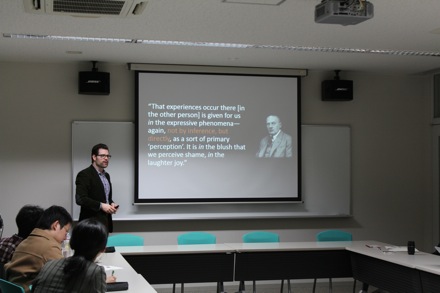[Report] The 9th Meeting of the Study Group “Philosophy of Disability and Co-existence”: Phenomenology of Disability
On 20th November, 2012, Dr Joel Krueger, a postdoctoral researcher at the Center for Subjectivity Research, University of Copenhagen, gave a talk entitled ‘Emotions and Social Perception: Lessons from Moebius Syndrome’.

Dr Krueger has drawn our attention to Moebius syndrome (MS),—a rare form of congenital bilateral facial paralysis, which was caused by the absence or underdevelopment of the cranial nerves, which control eye movements and facial expression. Sufferers lack facial animation and the ability to enact a particularly important form of nonverbal behaviour. He argued that MS offers a fruitful opportunity for exploring the role of implicit bodily communication in facilitating social cognition. In particular, Dr Krueger considered what MS can tell us about the nature of our emotional experience and perception of others’ emotional expressions, as well as the role that implicit bodily communication plays in shaping interpersonal understanding.

In the first part of his talk, Dr Krueger argued that certain bodily expressions constitute proper parts of emotion itself, referring to reports of diminished emotional experience in the autobiography of MS sufferers and the other types of deficits in facial movement, such as those caused by Bell’s palsy or Botox injections. Thus, he claimed that individuals with MS have a diminished experience of emotion, though sometimes they develop compensatory expressive expressions, such as eye contact, prosody, and body language, leading to recalibration of their emotional phenomenology.
In the second part of his talk, Dr Krueger pointed out that cases of MS enable a researcher to distinguish between two ways of conceptualizing the role of ‘coupling processes’ in social cognition: strong and moderate interactionism (SI & MI). Because they lack a capacity for covertly simulating other’s facial expression, individuals with MS are deprived of a primary channel for gestural coupling. According to SI, they lack an essential enabling feature for social interaction and interpersonal understanding more generally and thus sought to exhibit severe deficits in these areas. He challenged SI’s prediction with the empirical evidence from cognitive science, which confirmed the capacity of individuals with MS for detecting other’s emotion from facial expressions (Bogart and Matsumoto, 2010), and showed how MS cases offer compelling reasons for instead adopting MI’s pluralistic model of social interaction and interpersonal understanding. According to Dr, Krueger, mimicry is not necessary for emotional perception, but has a motivational effect in social interaction. Dr Krueger concluded that investigations of coupling processes within social interaction should inform rather than marginalize or eliminate investigation higher-level individual cognition.
Dr Krueger and the audience had a spirited discussion. His talk showed how it is significant to use phenomenological ideas in order to understand the lived world of those who suffer from Mobius Syndrome and the question it raises for philosophy.
(Report: Kazuki Iijima & Minae Inahara)






